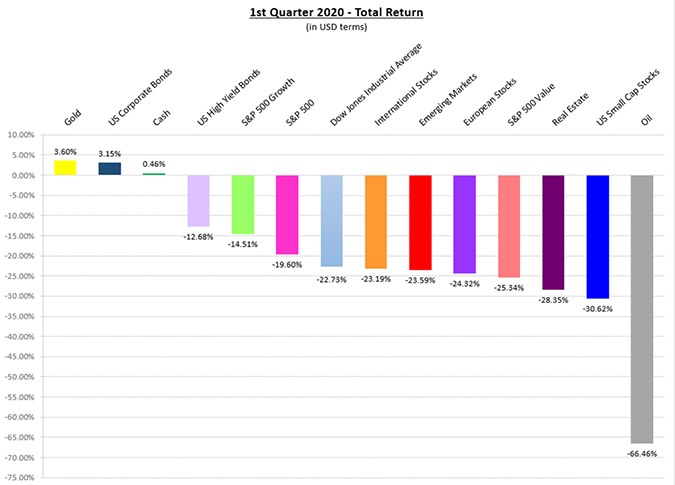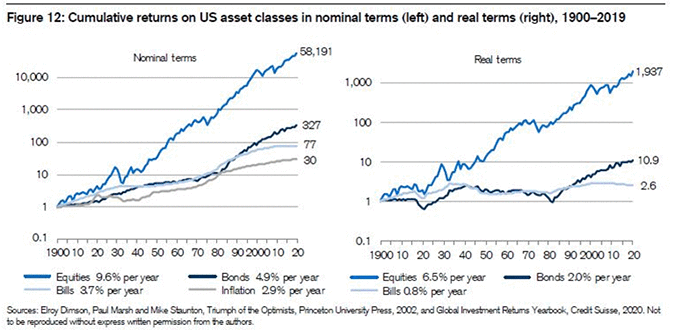CKBlog: The Market
Wednesday, April 15, 2020
The Longest Quarter
by The CastleKeep Team
We started our 2019 Annual Review letter with “Everything Worked.” The opposite was true in the first quarter of 2020.

Source: Bloomberg LP. The broad indexes represented in the graph are as follows: S&P 500 Index, S&P 500 Value Index, S&P 500 Growth Index, Dow Jones Industrial Average Index, US Small Caps: Russell 2000 Index, International Stocks: MSCI World Ex-US Index, European Stocks: MSCI Europe Index, Emerging Markets Stocks: MSCI Emerging Markets Index, Real Estate: FTSE NAREIT Developed Market Index, Gold: SPDR Gold Shares ETF (GLD), Oil: US WTI Crude Cushing Index, US Corporate Bonds: Bloomberg Barclays US Aggregate Total Return Index, US High Yield Bonds: Bloomberg Barclays US High Yield Total Return Index, Cash: Bloomberg Barclays US 1-3 Mo T-Bills. Data in US Dollar terms and as of March 31, 2020.
Nothing worked. It was very ugly and it happened so fast. Last quarter experienced:
- The fastest plunge into a bear market in history for the S&P 500 Index (SPX) and Dow Jones Industrial Average (DJIA). Both took less than 15 trading days to reach bear market territory (defined as a 20% drop from recent highs). Then they both continued to drop from there for a market correction equal to -33.79% and -36.48%, respectively, from the high on February 19th to the bottom reached during the quarter on March 23rd.
- Two of the five largest one-day losses for the DJIA in history (-12.93% and -9.99%).
- The fourth largest one-day gain for the DJIA in history (+11.37%).
- Lowest yield on the US Gov’t 10-Year Treasury Note in history (0.54%).
- Negative yields on the 1-, 3- and 6-month US Treasury Bills.
- A 19% drawdown in Investment Grade Bonds (iBoxx USD Liquid Investment Grade Index).
- A 50% drawdown in Bitcoin.
- A $2 trillion rescue package (CARES Act).
- An unprecedented $350 billion loan package to small businesses for the Payroll Protection Program (PPP).
- A ton of fear.
- A record amount of phone and video calls.
What we didn’t see? Panic selling by our clients. And for that, you should be commended. Drastic sales of risk assets may have saved you from further short-term losses during the quarter, but selling likely would have robbed you from the gains that stock and bond markets provide over the long haul. Thank you for sticking to the plan.
We could spend days combing through numbers, charts, projections and predictions. But as we learned (yet again) during times of crisis, it’s our behavior that matters most. We’d like to spend a few moments outlining why, as humans, this was a particularly difficult time in the markets.
Losses are Twice as Painful
Dr. Daniel Kahneman, the renowned Nobel Laureate and one of the psychologists who developed the theory of “Loss Aversion,” found that humans tend to feel a loss twice as severely as an equal gain.
So why does this happen? As humans evolved and ventured out of their caves, if they didn’t take danger seriously, the consequence was death. In order to survive and evolve, humans had to value the danger of going out for food more than pleasure they felt while eating it.
Think back to the last month. Did the 7% down days feel worse than the joy you felt during the 7% up days?
In 2019, stock portfolios gained around 20-25%. Over the last three months, stock portfolios lost 20-25%. Did you “feel more” in the last three months than you felt in 2019? Dr. Kahneman is nodding.
It’s perfectly natural that this quarter felt especially painful. We are wired this way.
Long-Term Focus is Required yet Nearly Impossible
Not only are losses more painful, we tend to pay more attention to them in times of crisis—yet another trait that has allowed us to evolve and thrive.
Thousands of years ago, it made sense that under normal conditions humans would focus on foraging for nuts and berries for the long winter. Just like investing, thinking long-term was wise. But when confronted by a large hungry bear, your collection of walnuts was rendered meaningless. Survival depended on focusing on the danger that was literally right in front of you.
So it’s no surprise if you logged in to check your portfolio daily (even hourly) over the last month. Intuitively, you know that Apple’s stock dropping 20% last month likely won’t materially impact your life ten years from now. But when stocks appear to be in free-fall, sometimes you cannot stop logging into your account to look.
As Dr. Kahneman put it in his groundbreaking book titled Thinking, Fast and Slow, “Nothing in life is as important as you think it is, while you are thinking about it.”
Stay the Course, Pick Your Spots
As we advise often, “stay the course.” This is especially true in times of panic. But that doesn’t necessarily mean a prudent investor can’t make changes to his or her investment portfolio. We witnessed widespread and indiscriminate selling of high quality businesses. The fund managers we follow were seeing the same thing—something we will learn more about in the coming weeks as fund managers disclose their positions. So while we didn’t make wholesale changes during the quarter, we made the following adjustments:
- Bought more of certain existing positions we believed were oversold;
- Added new securities that we believed were undervalued;
- Developed plans for further rebalancing.
Statement
Your quarterly statement is attached. It was an ugly quarter, one that most of us will never forget.
After you review and digest the numbers, please remember why investors are paid to own stocks and bonds in the long-run. The chart below, from Credit Suisse, depicts the returns for stocks, bonds, and cash (using US Treasury Bills) with and without adjustments for inflation since 1900:

An investor sitting in cash eliminates volatility but is subject to the ravages of inflation. Over time, they lose purchasing power. An investor in stocks and bonds is subject to volatility and in some cases, extreme volatility.
A quarter like the one we just experienced is the price we pay for the opportunity stocks and bonds offer us in the long term. To outpace inflation and build wealth, we must hold through times of great volatility.
What’s Next?
It is unknown when the COVID-19 pandemic will be under control. Despite the hopes of many, we do not expect life to be “normal” any time soon. But that does not mean our economy won’t recover—because it will. Much like after 9/11, as we re-emerge into society we may take more precautions, but we will continue to produce, adapt, invent, and endure.
We implemented our business continuity plan and have been operating without any issues. All “CastleKeepers” and family members remain healthy and unaffected medically from COVID-19. We hope the same for you and yours.
Never before have we been more grateful for the trust you place in us. Thank you.




